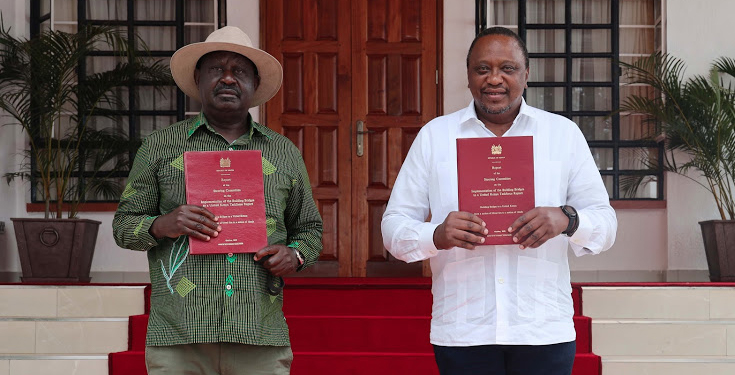Proposed administrative reforms under the BBI

The BBI Taskforce Report posits that a majority of Kenyans want things done differently. It highlights many factors that impede the implementation of administrative action such as:
- Negative attitude/ lethargy/ poor behaviour within the public service;
- Systems that are created to fail;
- Inadequate funding
- Lack of timely release of funding;
- Lack of political goodwill;
- Duplication or overlapping of functions;
- Too much bureaucracy (inconsistent flow of authority/indiscipline/nepotism/ parallel chain of loyalty where a junior enjoys patronage of his/her boss);
- Lack of information by the public;
- Lack of skills mapping and matching in the public service;
- Low uptake of ICT to reduce human interaction in service delivery in the public service;
- Lack of ethical standards;
- Lack of accountability;
- Lack of responsible citizenship;
- Lack of nationhood (people are not driven by public interest).
The BBI Taskforce Report proposes many reforms and for these reforms to be realised administratively, Kenya will need: - Committed Public Officers;
- Government Programmes and Interventions at Family Level;
- Institutional Focus on Administrative Processes in Line with the Constitution and the Law Working
The Administrative Mechanisms
1. National Ethos
- The most crucial national task is to think big and long-term.
- That vision must stand alongside an official and inclusive history.
- We must become comfortable in our own African skin.
- All of us have a responsibility.
- Link cultural values and modern norms of Kenyans
2. Responsibilities and Rights
- Recognise that the responsibilities and rights of Kenyans are rooted in the individual and they enable the knowledge and attitudes that strengthen responsible citizenship.
- Responsibility of leaders to utilise public service
- Form an Inter-Ministerial Taskforce
- Entrench ethics awareness, training and accountability in the workplace
- Growing by being of service 3.Ethnic Antagonism & Competition
- Build and strengthen the ties that bind us.
- Institutionalisation of national political parties
3. Divisive Elections
- Representation in the electoral system
- Changes to the Independent Electoral and Boundaries Commission
4. Inclusivity
- Kenyans yearning for inclusivity on political, economic, social, religious, cultural, age and gender basis
- Employment in the public services should reflect the ethnic, religious, regional and cultural Face of Kenya and be free from corruption in recruitment
5. Shared Prosperity
- Need for an economic revolution (for high-employment, highproductivity, value-creation and export economy) • Use scarce public resources for development, not bureaucracy
- Nurture and open opportunities for children and young people to show their initiative, innovation and entrepreneurship.
- Government development actions should be undertaken in every County.
6. Corruption
- Free Kenyans from cartel capture
- Using Prevention and Deterrence to Counter Corruption
- Digitisation of Government Services
- Stem public wastage
- Institutional reforms
7. Devolution
• Retain the 47 Counties and support the voluntary process of Counties forming regional economic blocs
- Changes to the County Executive • Kenyans need a far better healthcare system if this country is to be productive and prosperous.
- County Government spending-financing the development of each Ward to at least 30% of the County development budget within the five-year term.
- Counties also must grow the economic pie.
- No double taxation or double regulation at the National and County levels.
- Strengthen dialogue and integration of communities in the Counties, especially those that are multi-ethnic, with a focus on ensuring minorities are heard and respected.
8. Safety and Security
- Every life in Kenya has equal value.
- A people-owned National Security Strategy.
- Lower vulnerability to resource conflicts, disasters, emergencies and food insecurity.
- Terrorism as a continuing threat to Kenyans. • Police performance, mental health and wellbeing.
- Secure citizens from personal threats
9. Commissions and Cross-Cutting Issues
- Strengthening the Directorate of Criminal Investigations to complement the independence of the criminal justice system
- Significantly increase the amount of resources available to the Director of Public Prosecutions to enable effective prosecutions.
- Strengthen the Government Chemist to increase its effectiveness in carrying out its mandate.
- Commissions and independent offices should be subjected to stringent reviews by relevant bodies to ensure that they carry out their duties as mandated.

